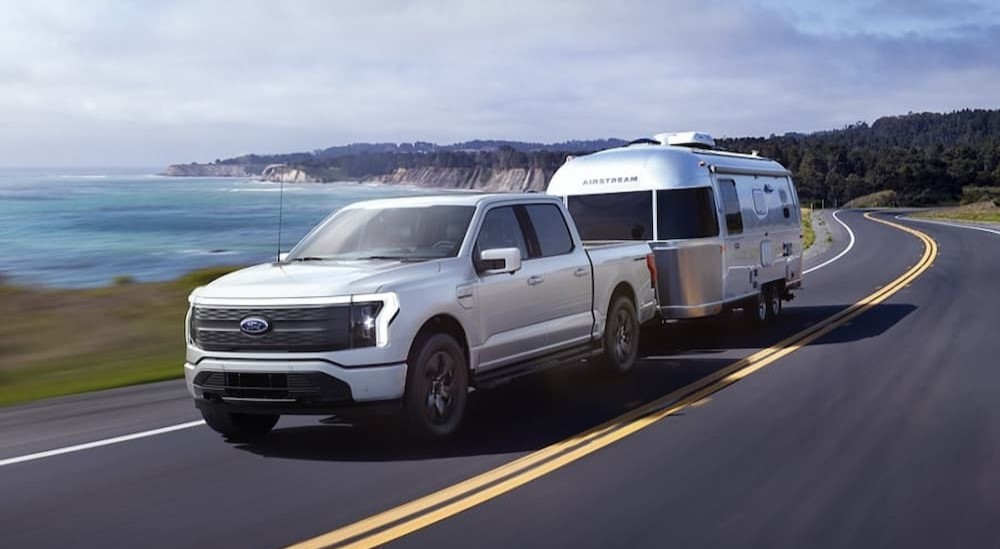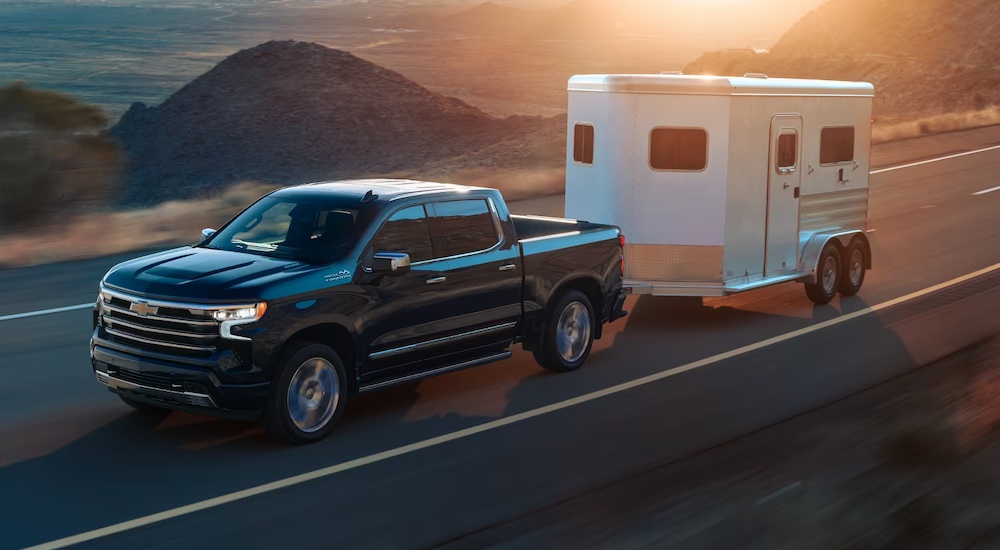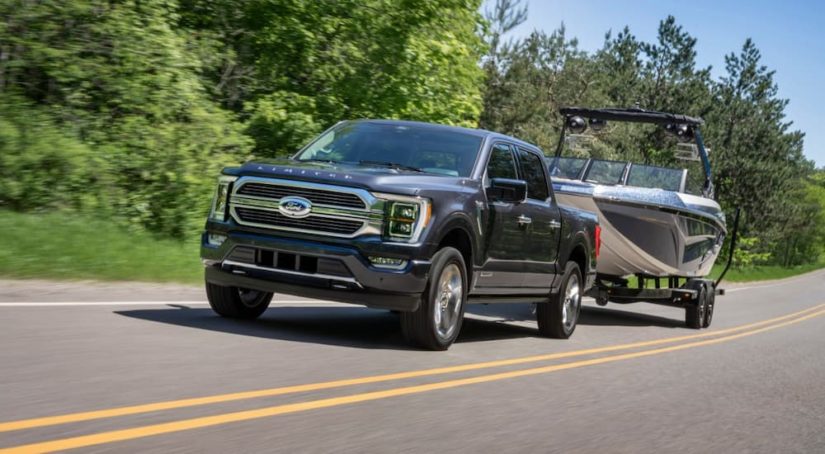Buying a pre-owned pickup truck opens a plethora of options when it comes to towing capabilities. Maybe you need to get your boat over to the lake for a day of fishing. Perhaps you want to tow a camper into the mountains for a weekend camping excursion. You might need a dependable truck for work. Whatever the case, shopping for used trucks for sale can result in you finding a great companion.
To make towing more efficient and secure, you will need to invest in a selection of features that enhance towing capabilities. What will you need to buy to get your pre-owned truck primed for towing? Let’s go over what you might want to put on your “to-buy” list.
Consider the Truck’s Towing Capacity
Understanding your pickup truck’s current towing capacity is important prior to making any further investments. Each pickup model has its own maximum towing capacity that is specified by its manufacturer, which will help you figure out how to tow within the truck’s limits. Should you exceed the max towing capacity, you could damage your truck, get into an accident, or simply cause undue wear on the truck.
Look at your pickup’s owner’s manual or go online and do some research about its tow ratings. Manufacturers will often advertise a maximum towing capacity for a model, but numerous configuration options will affect that, such as cab and bed size, two or four-wheel drive, and which engine is under the hood. Make sure you take all of these factors into account to determine the maximum towing capacity for your particular truck.
Get a Trailer Hitch
You will want to think about making a trailer hitch your main priority when buying a truck to use for towing. The trailer hitch is the connection point between whatever it is that you are towing and your pickup truck. There are multiple hitch classes, with each being crafted for specific towing capacities. You will need to select a trailer hitch that matches or beats the truck’s towing capacity.
You will find that there are three common trailer hitch types. The receiver hitch is the most flexible of the bunch, and works for a variety of accessories, including bicycle racks when you’re not towing a trailer. A fifth-wheel hitch is mounted inside the truck bed, and is typically used on big units, such as large campers and trailers. Similar to a fifth-wheel hitch is a gooseneck hitch, also installed in the truck bed, which works well for heavy-duty towing and offers enhanced stability.
Add a Set of Towing Mirrors
Your pre-owned pickup truck’s standard mirrors might not give you ample visibility to see around a wide trailer. If this is the case, investing in towing mirrors is worth your while. These mirrors can extend farther out than standard mirrors, letting you see better around the trailer. In fact, you can find some towing mirrors that are electronically adjustable for enhanced convenience. Your field of vision is expanded, keeping you and others around you safer while towing.
Slap on a Weight Distribution Hitch
Towing a heavy trailer requires the addition of a weight distribution hitch (WDH), which assists in evenly distributing a trailer’s weight across the truck and trailer axles. This serves to enhance control and stability, which makes it quite helpful when you are towing something large, such as a travel trailer. Just be mindful about selecting a WDH that matches your truck’s towing capacity, as well as the weight of the trailer you will haul.

Use a Trailer Brake Controller
One of the most helpful and necessary safety elements you can add for towing heavy loads is a trailer brake controller. A lot of newer trucks come already equipped with them, but not all pre-owned trucks have a trailer brake controller. This will let you control the trailer’s brakes independently from the truck’s own brakes, avoiding trailer sway. It also enhances your braking performance, putting the trailer’s wheels to work to help slow you down. Aftermarket trailer brake controllers are easy enough to find, and you can get one professionally installed to remain on the safe side while towing.
Invest in Towing Suspension Upgrades
Your truck’s standard suspension system might not be built to handle an incredibly heavy load. If you want to keep your truck stable and the ride comfortable, think about purchasing some suspension upgrades. Reinforced leaf springs, heavy-duty shocks, and air suspension systems can all assist your truck in handling the extra weight better and reduce the risk of trailer sway or sag.
Utilize a Load-Leveling System
While adding suspension upgrades is a great idea, getting a load-leveling system will serve to enhance your truck’s towing capabilities. These systems are built to automatically adjust to keep a level ride height, thereby preventing sagging from happening while the trailer is hitched up. Your truck and trailer can stay aligned, which makes for better handling and enhanced safety on the road.
Buy Load-Rated Tires
A good set of high-quality load-rated tires can enhance your truck’s safety and performance. They’re designed to handle the extra trailer weight. Tires should be inflated in accordance with the manufacturer’s recommendations, and having a tire pressure monitoring system installed lets you know when you need to adjust your tire pressure while towing.
Add a Transmission Cooler
If your pickup does not come with its own built-in transmission cooler, you might want to think about adding one. When you tow a heavy load, your truck’s transmission generates more heat, since it is working harder. Overheating can potentially lead to damage, but installing a transmission cooler can help maintain a cooler and more stable transmission temperature. This prolongs the life of your transmission and makes gear shifts feel smoother under heavy loads.
Other Towing Accessories to Consider
There are other towing accessories that you might wish to buy, as they can truly come in handy when you need to get the job done right. A trailer wiring harness gives your truck the proper connectors and wiring to power your trailer’s brakes and lights. Many trucks already have this, but older ones may not. Another accessory to consider, especially for larger trailers, is a trailer brake system. If your trailer does not have its own brakes, adding a hydraulic or electric brake system will enhance your stopping abilities.
A trailer hitch lock is worth your hard-earned money, since it adds a lock that stops hitch and trailer theft. Safety chains are necessary, since they are a backup in case your hitch fails. Wheel chocks can stop your trailer from rolling when parked, and lend an extra layer of stability when you hitch or unhitch the trailer. Finally, a retractable trailer tongue jack makes hitching and unhitching a trailer exponentially easier when it is under a heavy load.

Invest in Your Own Towing Training and Education
One final recommendation is that you take a towing safety course, or get some expert guidance from other truck owners who know a thing or two about towing. Increasing your skills and knowledge about towing can help you drive more safely and effectively. Familiarize yourself with weight distribution, various towing techniques, and different safety measures to ensure a more successful and less stressful towing experience.
Don’t Just Toe the Line, Tow More Effectively
Using your used pickup truck to tow heavy loads can be both practical and enjoyable, but you will need to carefully invest in the right equipment and plan for each trip. Safety should always come first, and the best way to start is by sticking to your truck’s given towing capacity and buying high-quality towing gear. Remember, trailer equipment requires annual maintenance to keep it in its best shape. With this at your disposal, you can hit the road with confidence and revel in all the towing benefits that your truck has to offer.



